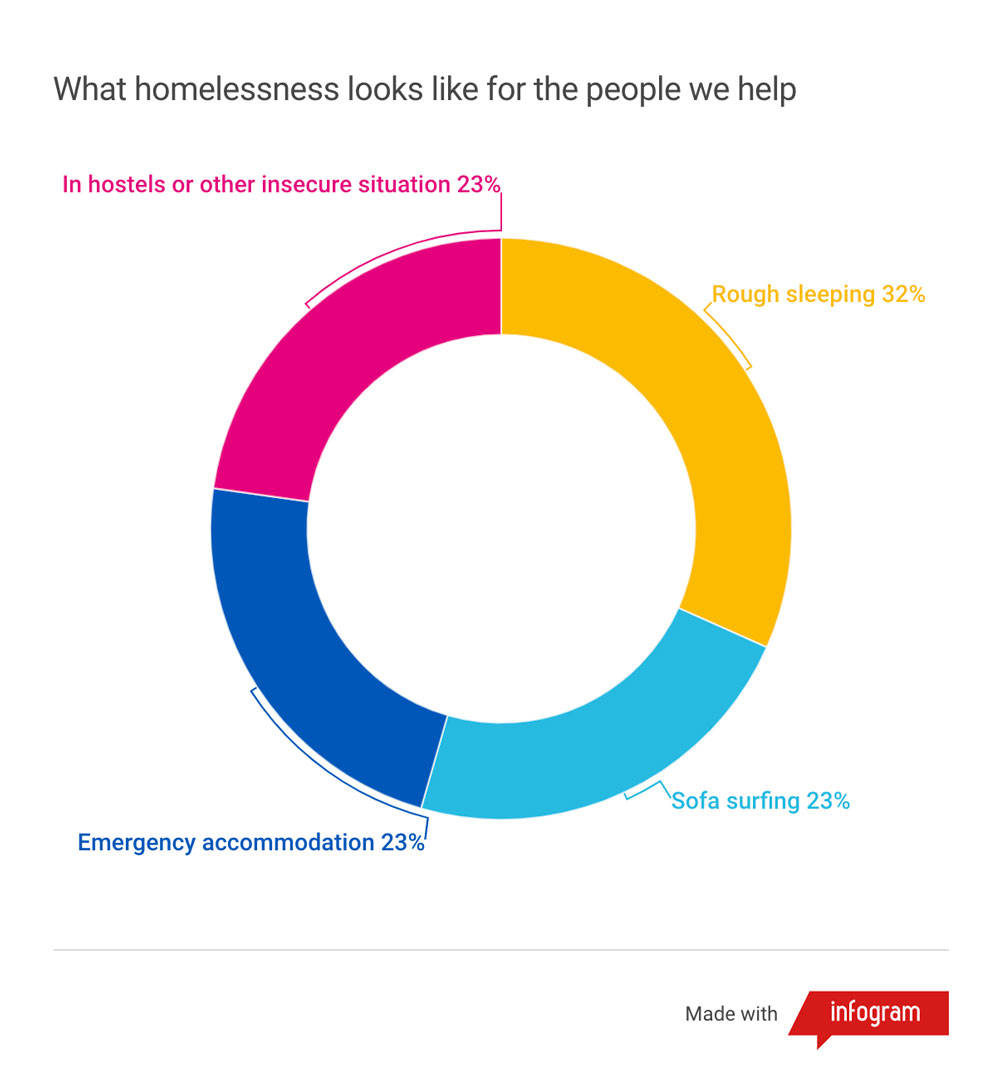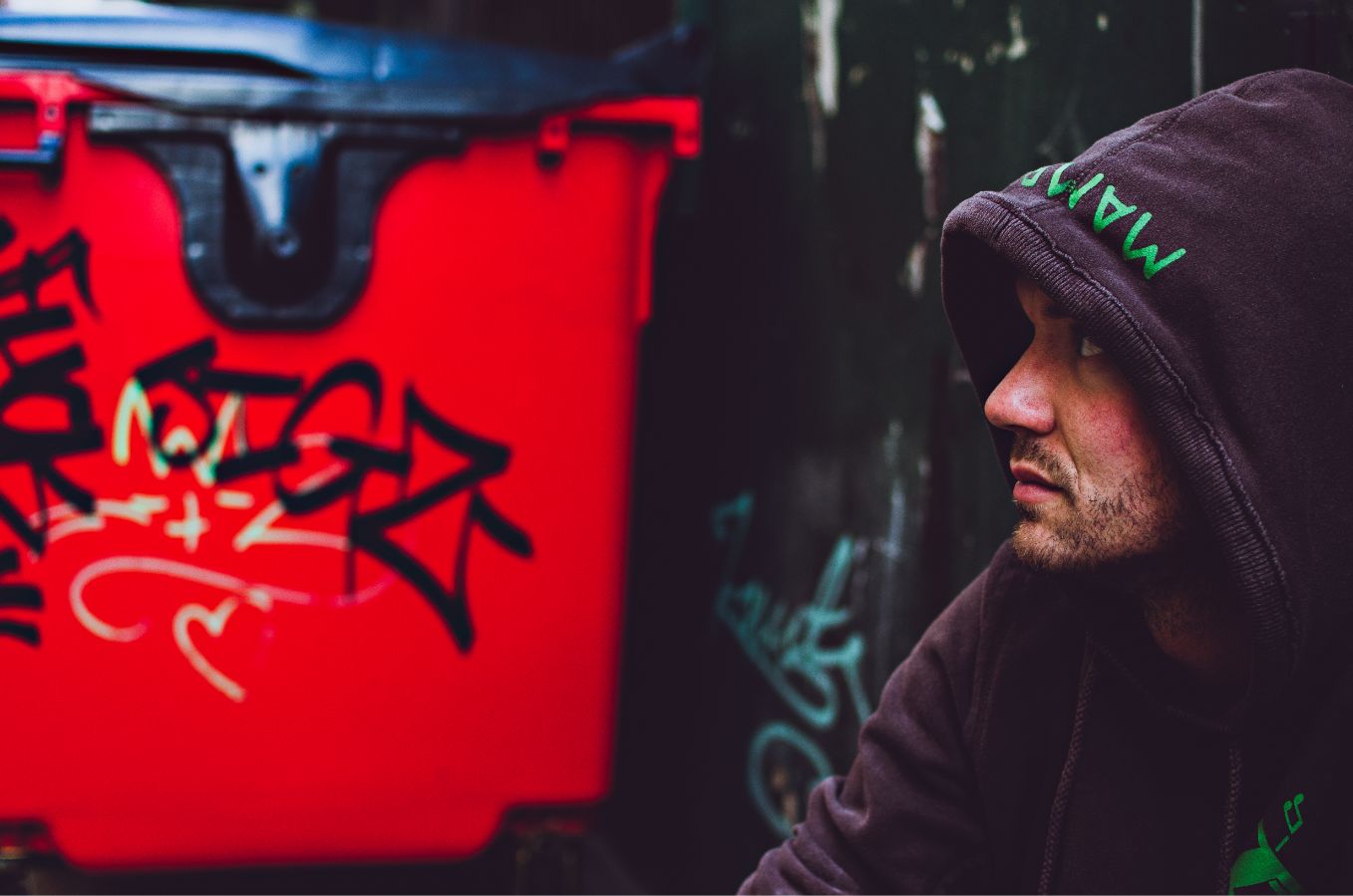
What does ‘experiencing homelessness’ mean?
Experiencing homelessness means not having a safe, secure and private place to call your own. About a third of the young people we help are rough sleeping, so this is just the tip of the iceberg.
Many more are considered to be part of the ‘hidden homeless’ population – they might be sleeping on a floor or ‘sofa-surfing,’ living in a temporary hostel, or somewhere else that isn’t a proper and permanent home.
If this is your life, you’re always having to move. You have nowhere to call your own or to keep your belongings safe. It can be dangerous – you are more likely to be the victim of violence if you’re experiencing homelessness. And you are also vulnerable to exploitation by others.
Homelessness also makes it harder to get the support you need. Without a permanent address, you can’t register with a GP, claim benefits, or in most cases, find a job.
The young people who come to us for help are often struggling with their mental health and their physical health can be suffering too, particularly if they are sleeping outside.
They usually have very little money and nowhere else to turn. They have often been let down by adults in their lives and can find it hard to trust others. Many have experienced trauma in their early lives.

How do young people end up without somewhere safe and secure to live?
Through our interactions with young people, we have found the most common cause of youth homelessness to be family or relationship breakdown. This could mean that a young person gets asked to leave, or that their home is not a safe place to stay anymore because of:
- new family relationships which can cause tension and arguments
- domestic abuse which puts young people at risk
- drug and alcohol misuse by those who are meant to care for young people
- a lack of living space, which means young people are asked to leave
If family support doesn’t exist or has been lost, it can be very hard for young people to secure stable accommodation due to a lack of social housing and inadequate benefit support.
Furthermore, a significant number of the young people we support have been in care. Young people leaving care can often have a harder time as they try and set up their own homes without any support. Research by Centrepoint among young people who had left care found that 26% had sofa surfed and 14% had slept rough.
Mental health issues like depression, anxiety and addiction can be a barrier in finding and maintaining stable accommodation. Without housing stability, research shows that mental health issues will almost certainly be exacerbated, due to the chaos and stress of living in precarious situations. Centrepoint research found that:
42%
of young homeless people have a diagnosed mental health problem or symptoms of poor mental health
21%
have experienced suicidal thoughts
29%
have self-harmed
18%
have attempted suicide
Youth homelessness in Brighton & Hove
According to Shelter, Brighton & Hove has the fourth highest homeless population outside of London (‘This is England: A picture of homelessness in 2019’, Shelter 2019). There are a number of social and economic reasons why the city is so badly impacted:
- High housing costs: the average monthly rent for a one-bedroom flat in Brighton is around £1,057; a room in a flatshare might cost £500-800 a month (‘Housing Market Report’, Brighton and Hove City Council, 2021). To put that in context, a 21-year old earning the minimum wage will take home around £1,100 a month. Some of our clients are working, but they are homeless because they cannot afford to rent.
- Lack of affordable housing: Brighton & Hove is a popular place to live but because it’s between a National Park and the sea, it’s hard to build new houses. There’s also a severe lack of social housing. Because of this shortage, rents in the private sector are high.
Inadequate benefits: Housing benefit changes have impacted badly on young people. Most under 35s are only entitled to a much lower allowance, making it harder to find somewhere affordable to live (‘Local Housing Allowance if you’re under 35’, Shelter, 2022). - Cuts to mental health services: reduced Government funding means access to mental health care and assistance is not as easily available. Many of the young people we see aren’t getting help early enough and the knock-on effects of this can be catastrophic.
- Problems in other parts of the country: some young people who come to us for help are fleeing from gang violence in other cities.
- Covid-19 job losses: Young people have been hit particularly hard by the labour market fallout from the pandemic, accounting for nearly half of job losses despite only representing 1 in 9 of those in work, (‘An Unequal Crisis’, Institute for Employment Studies, 2021).
Donate today and change a young person’s life for the better. Just £10 could pay for a young homeless person to have warm shower, a hot meal and clean clothes.
